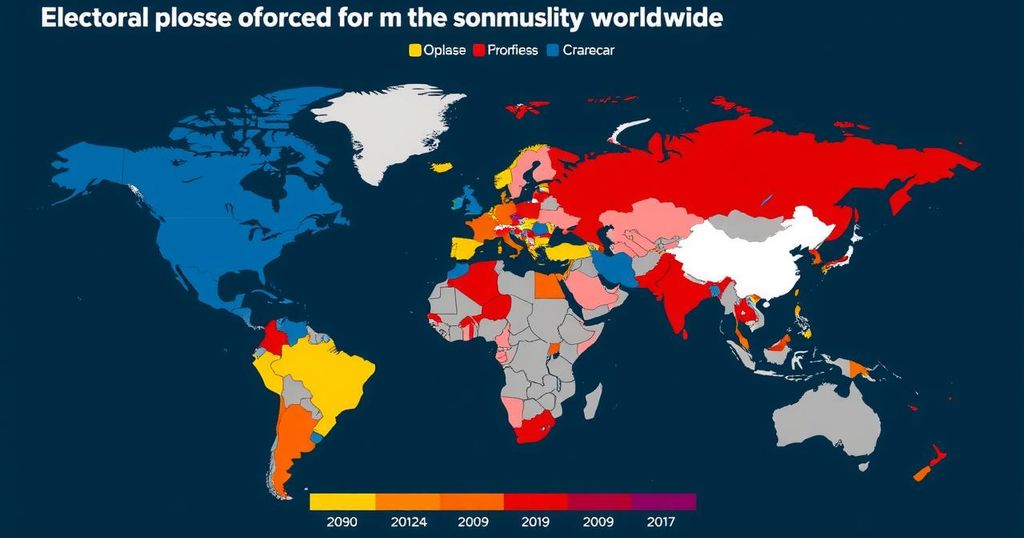Global Trends Highlight Incumbent Losses: A Look at the Democrats’ Struggles
Recent global elections show a significant trend of incumbent losses, with over 80% of democracies experiencing declines. While the U.S. Democrats faced challenges, they performed better than many counterparts, due in part to the relative strength of the U.S. economy. Voter discontent centered on inflation and economic issues remains a crucial factor for future electoral strategies, especially as Democrats will no longer be incumbents in upcoming elections.
As the aftermath of recent elections unfolds, it has become evident that the Democratic Party is not alone in its struggles with incumbent losses worldwide. Election analyses have increasingly focused on Vice President Kamala Harris’s campaign, dissecting various factors that contributed to its challenges. While domestic concerns and specific campaign strategies play crucial roles, a broader examination of global electoral trends highlights the challenging environment Harris faced, suggesting that any success for Democrats could have been seen as a remarkable deviation from global patterns. A pivotal observation from this election cycle is the unparalleled voter turnout, which is set to exceed all previous years. Voter discontent is palpable across the globe, particularly within democracies that held elections this year, where over 80 percent experienced a decline in seats or vote share by the incumbent parties. This widespread discontent is mirrored in various democracies, indicating a significant trend. Historically dominant parties in nations such as Japan, Botswana, and South Africa have faced unprecedented defeats, some surrendering power entirely. In Senegal, opposition candidate Bassirou Diomaye Faye achieved a remarkable victory, marking a historical milestone since independence in 1960. Sri Lankan voters also showcased their discontent, delivering overwhelming support for the opposition after a national tumult. In Europe, numerous incumbent governments faced severe setbacks, contrary to the typical advantages that incumbents have enjoyed in past elections. Despite this global trend of incumbent losses, the Democrats’ performance in the United States was comparatively moderate. According to the Financial Times, Democrats recorded one of the smallest reductions in vote share among higher-income countries during this election year, managing to maintain a strong presence in pivotal swing states while potentially gaining seats in the House of Representatives. One explanation for this relative resilience may lie in the U.S. economy’s performance, which stands out amid the global turmoil marked by inflation and slow growth following the COVID-19 pandemic. However, it is essential to recognize that American voters remain dissatisfied with their economic situation, as evidenced by prioritization of inflation and housing costs over positive indicators such as wage growth and low unemployment. Governments that successfully retained power – such as those in Mexico, Finland, and the Dominican Republic – did so largely by emphasizing national security concerns, in stark contrast to the focus of the U.S. campaign. While national security did not dominate the U.S. electoral discourse, immigration remained a prominent concern for voters, reflecting a complex landscape of electoral priorities. Ultimately, the United States mirrors the broader global sentiment of discontent, with economic anxiety proving detrimental to the Democratic Party’s prospects. However, a potential silver lining for Democrats lies in their status as a non-incumbent party for future elections, which may offer opportunities for renewed engagement and support as the electorate’s dynamics continue to evolve.
The article examines the broader context of electoral trends experienced by incumbent parties across multiple democracies in light of recent elections. It highlights the common thread of voter dissatisfaction globally, placing the Democratic Party’s performance within this framework. The analysis contrasts the U.S. electoral landscape with international outcomes, exploring factors influencing electoral success and failure linked to economic conditions and voter priorities, particularly in the aftermath of the COVID-19 pandemic.
In conclusion, the Democratic Party’s recent electoral performance reflects a microcosm of global trends showing widespread discontent with incumbent governments. While the Democrats fared better than many of their international counterparts, their ability to address economic concerns effectively remains paramount. Looking ahead, the Democrats, relying on their non-incumbent status, have a chance to recalibrate their approach to regain voter trust and engagement in future elections.
Original Source: abcnews.go.com




Post Comment